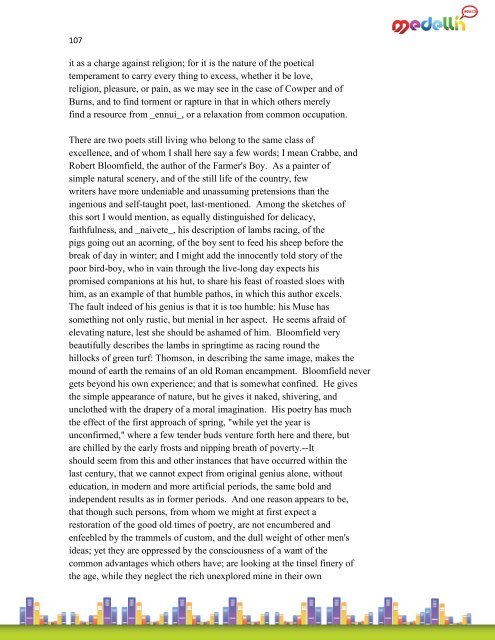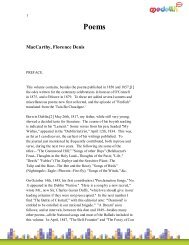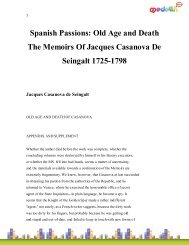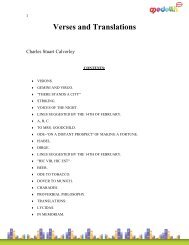Lectures On The English Poets William Hazlitt
Lectures On The English Poets William Hazlitt
Lectures On The English Poets William Hazlitt
Create successful ePaper yourself
Turn your PDF publications into a flip-book with our unique Google optimized e-Paper software.
107<br />
it as a charge against religion; for it is the nature of the poetical<br />
temperament to carry every thing to excess, whether it be love,<br />
religion, pleasure, or pain, as we may see in the case of Cowper and of<br />
Burns, and to find torment or rapture in that in which others merely<br />
find a resource from _ennui_, or a relaxation from common occupation.<br />
<strong>The</strong>re are two poets still living who belong to the same class of<br />
excellence, and of whom I shall here say a few words; I mean Crabbe, and<br />
Robert Bloomfield, the author of the Farmer's Boy. As a painter of<br />
simple natural scenery, and of the still life of the country, few<br />
writers have more undeniable and unassuming pretensions than the<br />
ingenious and self-taught poet, last-mentioned. Among the sketches of<br />
this sort I would mention, as equally distinguished for delicacy,<br />
faithfulness, and _naivete_, his description of lambs racing, of the<br />
pigs going out an acorning, of the boy sent to feed his sheep before the<br />
break of day in winter; and I might add the innocently told story of the<br />
poor bird-boy, who in vain through the live-long day expects his<br />
promised companions at his hut, to share his feast of roasted sloes with<br />
him, as an example of that humble pathos, in which this author excels.<br />
<strong>The</strong> fault indeed of his genius is that it is too humble: his Muse has<br />
something not only rustic, but menial in her aspect. He seems afraid of<br />
elevating nature, lest she should be ashamed of him. Bloomfield very<br />
beautifully describes the lambs in springtime as racing round the<br />
hillocks of green turf: Thomson, in describing the same image, makes the<br />
mound of earth the remains of an old Roman encampment. Bloomfield never<br />
gets beyond his own experience; and that is somewhat confined. He gives<br />
the simple appearance of nature, but he gives it naked, shivering, and<br />
unclothed with the drapery of a moral imagination. His poetry has much<br />
the effect of the first approach of spring, "while yet the year is<br />
unconfirmed," where a few tender buds venture forth here and there, but<br />
are chilled by the early frosts and nipping breath of poverty.--It<br />
should seem from this and other instances that have occurred within the<br />
last century, that we cannot expect from original genius alone, without<br />
education, in modern and more artificial periods, the same bold and<br />
independent results as in former periods. And one reason appears to be,<br />
that though such persons, from whom we might at first expect a<br />
restoration of the good old times of poetry, are not encumbered and<br />
enfeebled by the trammels of custom, and the dull weight of other men's<br />
ideas; yet they are oppressed by the consciousness of a want of the<br />
common advantages which others have; are looking at the tinsel finery of<br />
the age, while they neglect the rich unexplored mine in their own

















